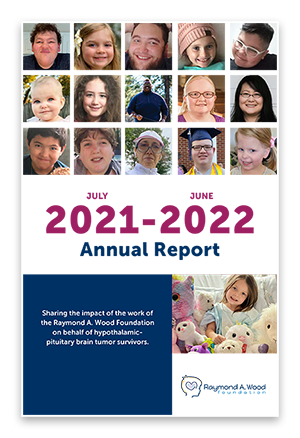The Fiscal Year 2022 (July 2021 – June 2022) Annual Report has been released and details our programs and initiatives, impact by the numbers, financial breakdown and our goals in the coming year.
According to Eugenie Hsu, board chair, “As a board composed mostly of brain tumor families, we never lose sight of our mission. This past year, we have continued to provide blood analyzers to medically fragile patients, network and build partnerships with pharmaceutical, clinician, and researcher stakeholders, offer cutting-edge research, education, and support to patients and families, advocate for hypothalamic obesity drug development, and conduct original research on the caregiver experience.”
Highlights include:
Our Why: What drives us in our advocacy for brain tumor patients.
What We Believe: Our vision, mission and core values.
Who We Are: Our staff, board of directors, & scientific advisory board.
Our Impact: The support we provide to our community and our milestones over the years.
Programs and Events: How we are are working to develop solutions for disease-related
challenges and creating opportunities for education.
Finding Solutions: Our work to solve the ongoing challenges of hypothalamic-pituitary brain tumors.
Strategic Goals: Our goals and objectives for the next three years.
Financial Report: Income and expenses in fiscal year 2022.
Getting Involved: How to be a part of the movement towards finding better tumor treatments and solutions for the long term challenges faced by survivors.
Eugenie says, “With the support of CZI, our new hires, and the leveraging of our growing network, we are excited to tackle more projects in the upcoming year to include developing a craniopharyngioma website hub, establishing an evidence-based treatment decision-making matrix at the time of diagnosis to optimize prognosis and quality of life, innovating an app and home-use sodium meter to better manage adipsic diabetes insipidus, establishing a patient registry, supporting a biobank to expand research on improving treatment options and outcomes, growing outreach to underserved communities, and increasing awareness and referrals of our services via medical providers to patients from diagnosis through long-term survivorship.”



